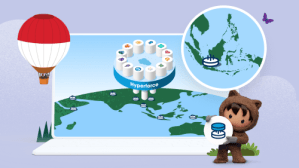The Salesforce Economic Impact: Growth in Revenue and Jobs for ASEAN



IDC study reveals billions of dollars in new business revenues for Singapore and Thailand, along with increased demand for digital skills.

Salesforce
Over the next five years, we could see tens of thousands of new jobs in the ASEAN region generated from the use of Salesforce. This forecast comes from the latest IDC study on the Salesforce Economic Impact which reveals USD$1.6 trillion in new business revenues and 9.3 million jobs to be created globally by 2026.
What does this mean for you? According to the study, individual companies, workers, and Salesforce partners all stand to benefit. There will also be indirect benefits to the local economy as a result of spending on goods and services by Salesforce and its ecosystem of customers, partners, and employees.
Here, we break down the findings of the study to show what’s behind this economic impact and explore what it means for the future of work.
The economic engine of Salesforce and cloud computing
The economic impact of Salesforce is intrinsically linked to the economic impact of cloud computing. As IDC states in its study, cloud computing frees up IT resources to enable IT and business innovation. This innovation then leads to the creation of new business revenues as well as benefits such as increased productivity.
So, to understand the economic benefits of Salesforce—and how to participate in them—it’s important to start with a look at what’s happening in cloud computing.
Cloud continues to grow in today’s work from anywhere world
Cloud-delivered software currently accounts for 43% of the software market and is expected to increase to 61% of the market by 2026. Digital transformation and the shift to a hybrid work environment will be key drivers.
Examining how customers are using Salesforce cloud services, IDC found a focus on both employee and customer needs. For example, customers are using Salesforce to establish their digital headquarters so they can deliver employee and customer success from anywhere. This digitisation is key as remote work, contactless customer engagement, and sustainability efforts become more prevalent than ever.
New revenues and jobs for Singapore and Thailand
In its study, IDC takes the overall economic benefits of cloud computing and narrows them down those tied to Salesforce and its ecosystem. This provides a global view of Salesforce’s impact on the economy.
This year, the study also features country breakdowns for Singapore and Thailand—both of which have forecast impressive growth in revenue and jobs for Singapore and Thailand:
- USD$6.6 billion in new business revenues and 18,600 new jobs to be created in Singapore by 2026
- USD$1.7 billion in new business revenues and 31,200 new jobs to be created in Thailand by 2026
“Salesforce is committed to empowering companies with the tools to provide their best service to customers. While the pandemic continues to pose challenges for economies around the world, we are heartened to note pockets of economic recovery and growth via the Salesforce economy. Helping our customer Trailblazers succeed is what drives us and we hope to continue supporting ASEAN’s growing economy and its incredible talent pool in the coming years,” said Sujith Abraham, Senior Vice President and General Manager for ASEAN at Salesforce.
Salesforce partner ecosystem accelerates growth
Salesforce partners play a crucial role in delivering cloud services to our customers in ASEAN. They are also a driving force behind the growth of the Salesforce economy and the data makes this clear.
IDC found that for every one dollar made by Salesforce in 2026, USD$6.38 and USD$6.28 will be generated by its partners in Singapore and Thailand.
“We believe ASEAN is a key growth engine for the APAC region and the statistics have solidified our perspective on the opportunities this market has to offer, said Latika Minocha, VP of Alliances & Channels for ASEAN at Salesforce. “This growth will be driven by our Partner ecosystem. We are actively recruiting additional Partners and working deeper with our existing partners so they can provide the Salesforce Customer 360 experience for our customers. We remain committed towards helping our ecosystem grow, learn, innovate and lead now and in the future.”
Increasing demand for digital skills
The creation of new jobs is good news for those entering the workforce or wanting to uplevel their career. However, unlocking new opportunities within the Salesforce economy will require new skills. In fact, 23% of new jobs created in the Salesforce customer base this year will leverage significant digital skills. For example, using automation tools, the Internet of Things ( IoT), and other complex applications. This figure is expected to rise to 37% by 2026, signalling a need for workers to start upskilling now.
Trailhead, Salesforce’s free online learning platform, empowers everyone to learn in-demand skills for the future of work. Learners can skill up from anywhere and earn globally-recognised credentials for careers in the Salesforce ecosystem. They can also join the Trailblazer Community, a network of millions of people who support one another to learn new skills and build their careers.
Meanwhile, Salesforce offers a number of solutions that can help take some of the workload off of customer’s IT departments. These include Tableau and MuleSoft, which offer analytical and integration tools critical for digital transformation.
Customers can also find partners and solutions to meet specific business needs in the Salesforce AppExchange.
Final takeaway
If there’s one key takeaway from the study, it’s that we are undergoing one of the biggest transformations in business history. The growing cloud economy is creating jobs and innovation. Now is the time for companies and individuals to skill up and get ready.
To learn more, download the IDC White Paper, sponsored by Salesforce, “The Salesforce Economic Impact”, doc #US48214821, September 20, 2021 or explore the data in Tableau.




















